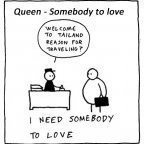Scores of Indigenous Villagers Fall Ill After Drinking Stream Water in Cambodia’s Mondulkiri Province
-
Recently Browsing 0 members
- No registered users viewing this page.
-
Topics
-
-
Popular Contributors
-
-
Latest posts...
-
112
UK Flat – Sell or Keep Renting? Expats Who’ve Been There – What Did You Do?
Thank you. Do you know if you can avoid CGT by moving back into your house (for a specified period) - and then selling? -
29
-
218
Don't chase happiness
Ah, so glad you have clarified your criteria. Only me & you online at the moment. -
180
Border Thai and Cambodian Troops Clash Near Ta Muen Thom Temple
Got woken up at 6am with the house shaking again. Still going on. Phanom Dong Rak, Kohk Klang, Surin- 1
-

-
34
Economy Rising Costs Threaten Thailand's Once-Thriving Restaurant Scene
Street food???! 🤣🤣🤣 -
9
-
-
Popular in The Pub


.thumb.jpg.d9f3e54432a0ae65f4d5beb0d2d122ce.jpg)









Recommended Posts
Create an account or sign in to comment
You need to be a member in order to leave a comment
Create an account
Sign up for a new account in our community. It's easy!
Register a new accountSign in
Already have an account? Sign in here.
Sign In Now